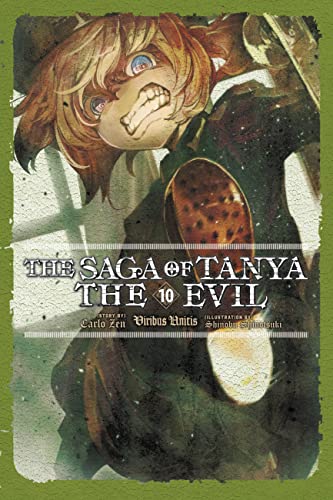By Carlo Zen and Shinobu Shinotsuki. Released in Japan as “Youjo Senki” by Enterbrain. Released in North America by Yen On. Translated by Richard Tobin.
As we get to the beginning of the end of this series, it’s worth looking at something we’ve discussed before: which world war is this? Tanya states clearly in this book she thinks she’s still in “the first war”, but is also very much fighting communism of a Stalinist rather than Leninist vein. We also have a clear Churchill analogue, as well as Lavrentiy Beria, who remains easily the most disturbing of all of Tanya the Evil’s disturbing villain characters. That said, given that this is a war fought with magic, I perhaps should not worry about it too much. In this particular war, the Unified States have finally entered the fray – at the behest of Ildoa, which the Empire is currently toying with. Given that the Empire is on its last legs, and the Unified States are a juggernaut of money and endless weaponry, you’d expect this to be bad news. You’d reckon without Zettour, though, who has decided to drag this entire war down into the gutter, to the point that even Tanya is aghast.
We pick up where we left off, with the Empire’s forces, including Tanya and company, in Northern Ildoa. Ildoa is not particularly worried about this – after all, they have far more manpower than the Empire, and the US is also now there. In addition, Colonel Drake’s international forces are told to leave the Federation and head there as well, which is incredibly aggravating for him, but that’s politics for you. That said, Ildoa and the US are not prepared for the Empire’s definition of war, which has changed tremendously over the course of the last few years. They still believe in things like honor and reason. The Empire has forgotten all that. Of course, given that Tanya keeps getting directed by Zettour into situations where she’s lucky to survive, she’s not worrying that much about this yet – and honestly would agree anyway.
I always enjoy seeing our heroes actually have to try a bit in the “military” part of this book. For all that Tanya’s attempts to escape this war have always failed on a political scale, there’s no denying her and her mage company are almost impossible to beat. Note the almost – Colonel Drake is in town, and not only are he and the Unified States using shotguns (which are supposedly banned, and Tanya gets so angry about this she literally writes a letter to the enemy in protest), but they also have Lieutenant Mary Sue, whose name may or may not be intentional, but if it is it would not surprise me. Tanya calls her a “bull” several times, and it fits – none of her company can even put a scratch on her, whereas Mary Sue nearly kills Tanya. The end of this series is going to have to have a final battle between these two, mano a mano.
The next books in the series are a two-parter, with the second due out in Japan in a few days. Given how long each Tanya book is to begin with, that’s sobering news. Still, I’ll always be hear to watch Tanya desperately try to figure out how to defect before everyone in the Empire is killed or executed. Also, kudos to the artist for that Mary Sue picture, which is hilarious and not remotely patriotic.



